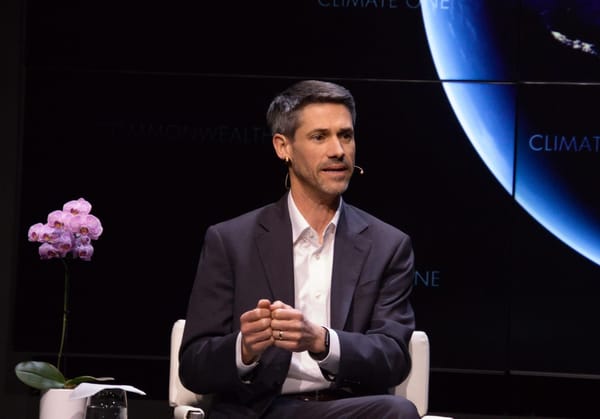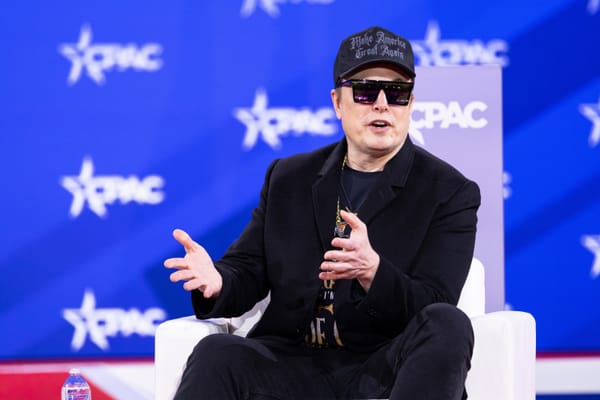Esmeralda: Network State comes for Cloverdale
The questions no one is asking about strange new California ‘town’

When Devon Zuegel presents her Esmeralda development proposal to the Cloverdale City Council today, residents may not realize they're hearing a pitch from someone with deep ties to the Network State—a tech-funded movement to create corporate-controlled territories around the world.
Here are my notes on Esmeralda, a strange new tech town being proposed near Cloverdale, a small town in Sonoma County, California. With the Esmeralda project poised to move forward, I have updated my notes lightly for publication. Unfortunately, the mainstream California press continues to prove itself incapable of covering this issue accurately, choosing to ignore the Network State movement as it grows in plain sight. (See bottom for a list of things the Cloverdale community deserves to know about Esmeralda.)
The Point: A self-described real estate developer with ties to Balaji Srinivasan’s Network State cult plans to build a new “town” near Cloverdale, in California's Sonoma County. Devon Zuegel–CEO of the Esmeralda Land Company–officially announced the plan on X in 2024.
Zuegel does not appear to have much previous experience with real estate development. This fits a Network State pattern of recruiting inexperienced people to build its cities of tomorrow. And she told the San Francisco Chronicle that Esmeralda has nothing to do with other tech dystopia projects like California Forever. Yet there are significant holes in her story.
Back Story: In July 2024, the Santa Rosa Press Democrat wrote that a company had acquired a 267-acre plot of land near Cloverdale, a town of roughly 9,000 people in rural Sonoma County:
A massive, vacant swath of land in southeast Cloverdale that once was to be transformed into a $200 million resort suddenly is slated for potential development by a surprise buyer: a company linked to Edge Esmeralda, the “pop-up village” that attracted visitors from around the world to Healdsburg in June.
Esmeralda Land Company, run by Devon Zuegel, a principal behind Edge Esmeralda, has entered into a purchase agreement for the 267-acre site, which has sat quietly on the real estate market for seven years.
Zuegel told the Press Democrat she planned to turn the open space site into “a full-time neighborhood that includes a hotel.”
What she apparently didn't mention was her affiliation with the cultish Network State movement, which seeks to build weird new tech-governed cities around the world.
The people of Sonoma County may think they're getting some run-of-the-mill new community development with a hotel. In reality, the Network State cult has now extended a tentacle into their community.
A 'new town' in Sonoma
On October 17, 2024, Zuegel made her plans official with a post on X/Twitter:
I've been quietly working on something for a while, so I'm excited to finally be able to share it with you...
We are creating a new town called Esmeralda!
Our team has an exclusive option on a beautiful piece of land 90 mins north of SF, in California wine country
A new town? That seemed a little different from what Zuegel told the Press Democrat in July 2024: “We will be part of Cloverdale. We aren't separate. It will be a full-time community that will be integrated fully in Cloverdale.” (At the time, Cloverdale Mayor Todd Lands told the San Francisco Chronicle “it’s a little early to be promoting” Esmeralda.)
Zuegel has popped up repeatedly on the radar since I started writing about the Network State cult. She was a big booster for California Forever, the tech “utopia” a group of tech billionaires is trying to build in Solano County.
In March 2024, she did a joint podcast appearance with California Forever CEO Jan Sramek. In June 2024, Zuegel launched a “pop-up village” called Edge Esmeralda near Healdsburg, which is also in Sonoma County. This was a sort of month-long cross between a tech conference and a cult commune, with a focus on artificial intelligence, crypto and longevity. It marketed itself as a “gathering for people building the future.” Participants included Network State figure Patri Friedman, who leads Pronomos Capital, a company funded by Peter Thiel and Marc Andreessen that is proposing Network State cities around the world. California Forever CEO Sramek also attended.
Esmeralda and the ‘Network State’
In September 2024, Zuegel was one of the first speakers at the Balaji Srinivasan's Network State conference, where she compared her idea to Chautauqua, a lakeside town in New York once known for the Chautauqua Institution, a cultural and educational center offering lectures, concerts, and workshops. (Srinivasan believes the USA is headed toward collapse/Civil War. He is also an advisor to Pronomos Capital.)
By speaking at the Network State conference, Zuegel clearly aligned herself with Srinivasan and the Network State, which is hardly a surprise. For years, she has been promoting the need for wealthy tech figures to create new cities. In 2021, she visited Próspera, a Thiel-backed Network State project in Honduras, and wrote a 42-page report on it.
Zuegel’s paper on Próspera was exceedingly positive, though by most accounts has become a “nightmare” for Honduras and the project is currently suing the Honduran government for nearly $11 billion. But for 42 pages, Zuegel obsessively analyzes every aspect of Próspera and the business of starting a Network State city.
Further, Zuegel’s partner in Edge Esmeralda, Timour Kosters, highlighted Esmeralda at the 2025 Network State conference.
“This is early, but it's real, and it's moving from theory to execution,” wrote Kosters, in a reflection on the Network State movement. “The question has shifted from ‘is this possible?’ to ‘how do we do this well?’ I'm curious to see how the next year unfolds, and what next year’s conference will look like as more projects mature and more unexpected actors enter the space.”
Zuegel has also become a regular on tech-oriented podcasts, where she seems to be regarded as an expert on urbanism and city building.
This is odd, because it’s not clear where Zuegel acquired such expertise. She graduated from Stanford University in 2016 with a degree in computer science (with a concentration on artificial intelligence). At Stanford, Zuegel spent three years and nine months as editor in chief of the Stanford Review, the right-wing student newspaper co-founded by Peter Thiel. The Stanford Review has served as a recruitment mechanism for Thiel protégés, including Trump AI/Crypto Czar David Sacks, Palantir co-founder Joe Lonsdale, and others. And the current movement to create new tech-governed cities around the world is largely rooted in Thiel’s ideas.
Zuegel spent most of her career working as a software engineer. Her only foray into the issue of housing, according to her LinkedIn profile, is volunteering to create a website for California YIMBY (a housing developer pressure group) in 2018.
Analysis: Unless Zuegel has some hidden expertise in housing and urban development, her emergence as a builder of new towns seems quite unusual. Anyone familiar with the land and real estate development business will tell you it is not a pursuit for amateurs. It’s a high-risk field fraught with complexity and complication.
The decision to put Zuegel at the head of the project suggests that Esmeralda is not just about real estate development. The project has a deeper idea behind it—and that the deeper idea is clearly aligned with the Network State ideology. (The same is true of Praxis, a Network State project that plans to build a new city in the Mediterranean/Greenland/Santa Barbara County and is led by a 29-year-old with no real estate experience. Nonetheless, Praxis recently declared it has amassed over $500 million in financing for the project.)
So it will be interesting to see how this idea develops in Sonoma County, which seems more welcoming than Solano County, where tech billionaires have struggled to impose their new tech utopia on the citizenry.
A new high-end retreat for wealthy Silicon Valley types would hardly be cutting edge. The Sonoma/Napa area is full of resorts for successful and wealthy types (whom Zuegel refers to as “high agency people”). But the Network State idea is about more than creating an AI-powered Esalen Institute. It's about creating new territories governed by tech corporations.
In an interview with the San Francisco Chronicle in 2024, Zuegel pushed back on the idea that her project is similar to California Forever. Instead, she made it sound like a normal suburban development rather than a Network State project. (Interestingly, the fantastical AI-inflected renderings Esmeralda has released bear a striking resemblance to the images released by California Forever and the Network State conference.)
Zuegel denied that Esmeralda is building what the Chronicle framed as “self-isolating communities that ostracize outsiders while rewarding community members” (The Chronicle came close with that question...next time try asking directly about the “Network State”).
Zuegel also denied that Esmeralda has anything to do with crypto.
From the Chronicle:
Q [Chronicle]: There’s been some dialogue about cryptocurrency in reference to Esmeralda. How is crypto related to the planned city, if at all?
A [Zuegel]: We’ve heard that dialogue too, and to be honest, we’re not sure where it’s coming from! This is not a crypto project.
Our best guess of the source of that confusion is that the Edge Esmeralda event had some speakers who are involved in the field of mathematical cryptography as well as some involved in cryptocurrency, but those were just a few topics out of dozens that were discussed at the event, much like how a college campus has a wide array of disciplines.
But Zuegel is clearly a crypto booster and sure does a lot of talking about the relationship between cities/states and crypto.
Here she is talking about “inflation, Argentina and crypto” in 2022. And here she is leading a panel discussion on “Cryptonetworks and Cities” at Andreessen Horowitz in 2018. (Marc Andreessen is a key supporter of the Network State cult, and Network State evangelist Srinivasan is former general partner at Andreessen Horowitz.)
Conclusion: These are just my quick notes on Esmeralda, and there will be more to come as a take a deeper dive on the subject in the months to come. Before Cloverdale approves anything, here are some things the community deserves to know:
Is Esmeralda a Network State project?
If so, what does that mean, exactly?
If not, why does Zuegel keep popping up in the context of Network State projects (And why does Esmeralda overlap so completely with the Network State concept)?
Does the project plan to seek autonomy or special economic zoning?
Who are the “patient, values-aligned investors” funding this project? What are the values with which they align? Why the secrecy?
Are Balaji Srinivasan or Pronomos Capital investors in Esmeralda?
Do any of Esmeralda’s investors also have Network State ties?
These answers would go a long way toward telling us what Esmeralda is really about.
Further reading:

Also: Crypto, Venture Capital and New Urbanism https://www.researchgate.net/publication/396231327_Crypto_Venture_Capital_and_New_Urbanism






